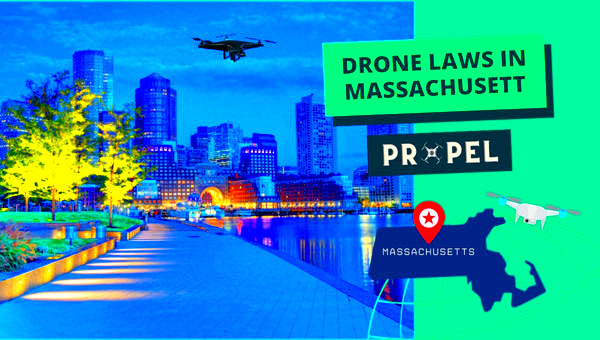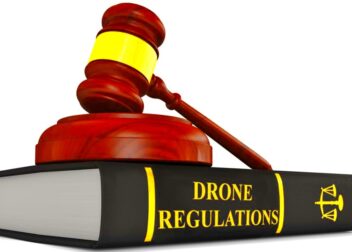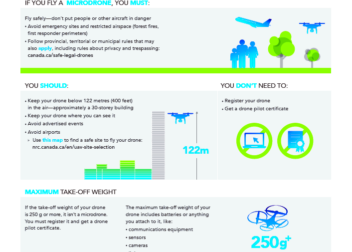Understanding Drone Laws in Massachusetts
Flying drones in Massachusetts requires a grasp of the legal framework. With advancing technology the regulations governing it also change. In my view navigating these rules can be akin to solving a puzzle. The state has established laws to promote the use of drones while addressing privacy and security issues. Whether you’re a recreational flyer or a business operator being aware of these guidelines can spare you from future inconveniences and enhance your flying experience without any legal complications.
Basic Regulations for Drone Use
In Massachusetts the use of drones is regulated by a combination of state and federal laws. Here are the important things to keep in mind.
- FAA Registration: If your drone weighs over 0.55 pounds, it must be registered with the Federal Aviation Administration (FAA). This is a crucial step for compliance, ensuring your drone is officially recognized.
- Line of Sight: Always keep your drone within visual line of sight. This means you should be able to see your drone with your naked eye at all times during flight.
- Altitude Limits: Drones are restricted to a maximum altitude of 400 feet above ground level to avoid interfering with manned aircraft.
- Prohibited Areas: Avoid flying near airports, military bases, and other sensitive areas. Massachusetts has specific zones where drone operations are restricted or prohibited.
- Night Flying: Flying drones at night requires special authorization. Always ensure you have the necessary permissions if you plan to operate after dark.
These guidelines are put in place to protect both your security and confidentiality adhering to them can help prevent any potential legal issues.
State-Specific Drone Laws in Massachusetts
Massachusetts has customized its drone rules to tackle issues. Here are a few laws specific to the state that you should keep in mind.
- Privacy Laws: Massachusetts takes privacy seriously. Drones equipped with cameras are subject to stringent privacy laws. Avoid capturing images or videos of individuals without their consent, especially in private settings.
- Local Ordinances: Different cities and towns within Massachusetts might have their own ordinances regarding drone use. For instance, some municipalities may impose additional restrictions on where you can fly your drone. Always check local regulations before operating.
- Recreational and Commercial Use: There are different requirements for recreational and commercial drone use. Commercial operators must adhere to stricter regulations and often need to obtain specific permits.
Keeping up to date with state and local rules is crucial to make sure you’re flying legally. If you’re unsure seeking advice from local officials or a lawyer can provide clarity on any confusion.
Federal Regulations Impacting Drone Operation
When it comes to flying drones in Massachusetts, federal regulations hold importance. These rules established by the Federal Aviation Administration (FAA) are in place to ensure that drone activities are carried out safely and responsibly nationwide. Based on my experience dealing with these regulations can be a mix of being simple and challenging depending on how you intend to use your drone. Lets delve into the federal regulations that influence drone operations.
- FAA Part 107 Rules: These rules apply to commercial drone operators and include requirements for passing a knowledge test, registering your drone, and adhering to specific flight restrictions. If you’re using your drone for commercial purposes, understanding and complying with Part 107 is crucial.
- Operational Limits: The FAA imposes operational limits, such as maintaining visual line of sight, not exceeding 400 feet in altitude, and not flying over people. These rules are designed to minimize the risk of accidents and ensure drones don’t interfere with manned aircraft.
- Airspace Restrictions: Drones must avoid restricted airspace, which includes areas around airports and military installations. Before flying, it’s essential to check the airspace status and obtain necessary clearances if required.
- Night Flying Rules: Operating a drone at night requires special authorization from the FAA. This rule is in place to enhance safety, as night flying presents additional challenges for both the operator and others in the airspace.
Following these federal rules is essential for ensuring that your flights are both lawful and secure. Staying informed about any updates to these regulations is wise to prevent any possible complications.
Permits and Registration Requirements
Getting the permits and registrations to operate a drone is key to staying on the right side of the law. Speaking from experience this can feel like a bit of red tape but its vital for making sure you fly by the rules. Here’s a rundown of the permits and registration needed for drones.
- FAA Registration: Any drone weighing more than 0.55 pounds must be registered with the FAA. The registration process is relatively simple and involves filling out an online form and paying a small fee. Once registered, you’ll receive a unique identification number that must be displayed on your drone.
- Remote Pilot Certification: If you’re flying commercially, you need to obtain a Remote Pilot Certificate from the FAA. This involves passing the FAA’s Part 107 Knowledge Test, which covers various aspects of drone operation, including regulations, airspace rules, and safety procedures.
- Special Authorizations: For specific types of operations, such as flying over people or at night, you may need additional authorizations. Applying for these special permits usually requires demonstrating that you have the necessary skills and equipment to operate safely.
Ensuring that you possess the necessary permits and registrations not only helps you stay in line with regulations but also guarantees that your drone activities are carried out in a responsible and secure manner.
Rules for Flying Drones in Different Locations
The regulations regarding drone flights can differ greatly based on your location. In my opinion it’s essential to familiarize yourself with the rules specific to each area to steer clear of penalties and ensure safe flying. Here’s a helpful overview to grasp these regulations better:
- Urban Areas: Flying drones in densely populated urban areas often comes with stricter regulations due to concerns about privacy and safety. Many cities have specific ordinances that restrict where drones can be flown, so it’s essential to check local laws before taking off.
- Parks and Recreational Areas: Many parks and recreational areas have designated zones for drone use. These zones are usually set up to ensure that drone activity doesn’t interfere with other park-goers. Always look for signs or consult with park authorities before flying.
- Private Property: When flying over private property, it’s a good practice to seek permission from the property owner. This helps avoid privacy issues and potential legal disputes.
- Event Venues: Flying drones over events or large gatherings often requires special permissions. Event organizers may have specific rules to ensure safety and prevent disruptions.
Being mindful of and adhering to rules that vary by location is key to flying responsibly and steering clear of any possible issues. Make it a point to gather information beforehand and if you’re uncertain reach out to the relevant authorities to confirm that you’re following all the necessary guidelines.
Penalties for Violating Drone Laws
It’s important for anyone flying a drone to be aware of the consequences of breaking the law. As someone who has piloted drones I can attest that claiming to be unaware of the rules won’t save you from facing legal consequences. The punishments can vary from fines to criminal charges based on how serious the infraction is. Lets delve into the potential repercussions you could encounter for disregarding drone regulations.
- Fines: Minor infractions, such as flying in restricted airspace without authorization, can result in substantial fines. These fines can vary based on the specific violation and its impact on safety or privacy.
- Seizure of Equipment: In some cases, authorities may confiscate your drone if it’s used unlawfully, especially in sensitive areas. This can be a costly and inconvenient penalty.
- Criminal Charges: Serious violations, like deliberate interference with manned aircraft or repeated breaches of regulations, can lead to criminal charges. This could result in a criminal record and additional legal consequences.
- Suspension of Certification: For commercial operators, violations can lead to the suspension or revocation of your Remote Pilot Certificate. This affects your ability to legally operate drones for business purposes.
To avoid facing these penalties its wise to stay updated and adhere to all rules. By operating your drone responsibly you not only stay compliant with the law but also play a role in enhancing the safety of drone activities.
Updates and Changes to Drone Laws
Drone regulations are not set in stone they change with advancements in technology and the emergence of new challenges. Its crucial for all drone pilots to stay informed about these developments. I have witnessed how swiftly rules can change catching even seasoned operators by surprise at times. Here’s a guide on how to stay abreast of the most recent updates.
- Follow Official Sources: Regularly check the FAA’s website and other official sources for updates. They provide the most reliable information on any changes to regulations.
- Join Drone Communities: Engaging with local and online drone communities can provide insights into upcoming changes and practical advice from fellow operators.
- Subscribe to Newsletters: Many drone industry organizations and legal experts offer newsletters that keep subscribers informed about the latest developments in drone laws.
- Attend Workshops and Seminars: Participating in workshops and seminars can be a great way to learn about new regulations and how they might impact your drone operations.
Staying updated and informed allows you to navigate changes smoothly and ensures that you remain compliant with the law.
FAQ
Q: Do I need a license to fly a drone recreationally in Massachusetts?
No you dont need a license to fly for fun. However you do have to stick to the FAA rules and register your drone if it weighs over 0.55 pounds.
Q: What should I do if I accidentally fly into restricted airspace?
If you happen to fly your drone in an area with airspace, make sure to land it safely right away. It’s crucial to notify the authorities about the incident and take measures to prevent making the same error again.
Q: Are there specific rules for flying drones near schools?
A: Absolutely, there are regulations in place that restrict drone flights near schools to safeguard student privacy and maintain safety. Its important to review the rules in your area before taking off in such locations.
Q: How can I find out if new drone regulations are coming?
Keep yourself in the loop by staying tuned to official FAA news, becoming part of drone lover communities, signing up for industry newsletters and participating in relevant events and training sessions.
Conclusion
Navigating the landscape of drone regulations can be quite a challenge as the rules are always changing and adapting. Speaking from experience, I can say that staying updated and following the guidelines is crucial for having a seamless and stress free flying experience. Whether you’re flying drones for fun or in a commercial capacity it’s vital to grasp and comply with both federal and state specific regulations. Don’t forget to stay informed about any legal changes and feel free to seek advice if you’re uncertain about anything related to drone operations. By doing you not only prioritize your safety but also promote the use of this thrilling technology.


